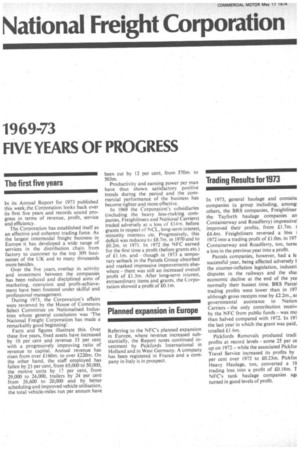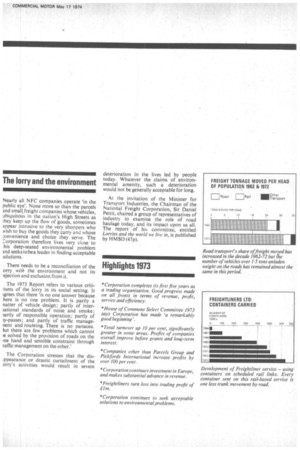1969-73 FIVE YEARS OF PROGRESS
Page 46

Page 47

If you've noticed an error in this article please click here to report it so we can fix it.
The first five years
In its Annual Report for 1973 published this week,the Corporation looks back over its first five years and records sound progress in terms of revenue, profit, service and efficiency.
The Corporation has established itself as an effective and coherent trading force. As the largest intermodal freight business in Europe it has developed a wide range of services in the distribution chain from factory to customer to the top 300 businesses of the UK and to many thousands more besides.
Over the five years, overlap in activity and investment between the companies has been reduced and disciplined aims of marketing, operation and profit-achievement have been fostered under skilful and professional management.
During 1973, the Corporation's affairs were reviewed by the House of Commons Select Committee on Nationalised Industries whose general conclusion was The National Freight Corporation has made a remarkably good beginning'.
Facts arid figures illustrate this. Over these five years, fixed assets have increased by 10 per cent and revenue 33 per cent with a progressively improving ratio of revenue to capital. Annual revenue has risen from over 1160m. to over £220m. On the other hand, the staff employed has fallen by 23 per cent, from 65,000 to 50,000, the motive units by 17 per cent, from 29,000 to 24,000, trailers by 24 per cent from 26,600 to 20,000 and by better scheduling and improved vehicle utilisation, the total vehicle-miles run per annum have been cut by 12 per cent, from 570m. to 503m, Productivity and earning power per man have thus shown satisfactory positive trends during the period and the commercial performance of the business has become tighter and more effective.
In 1969 the Corporation's subsidiaries (including the heavy loss-making companies, Freightliners and National Carriers) traded adversely at a loss of £14m. before grants in respect of NCL, long-term interest, minority interests etc. Progressively, this deficit was reduceu to £8.7m. in 1970 and to £0.2m. in 1971, In 1972 the NEC earned for the first time a profit (before grants etc.) of £1.1m. and though in 1973 a temporary setback in the Parcels Group absorbed and masked impressive improvements elsewhere there was still an increased overall profit of £1.3m. After long-term interest, extraordinary items and grants, the Corporation showed a profit of £0.1m.
Planned expansion in Europe
Referring to the NFC's planned expansion in Europe, where revenue increased substantially, the Report notes continued investment by Pickfords International in Holland and in West Germany. A company has been registered in France and a company in Italy is in prospect.
Trading Results for 1973
In 1973, general haulage and containt companies (a group including, among others, the BRS companies, Freightliner the Tayforth haulage companies an Containerway and Roadferry) impressivel improved their profits, from £1.7m. £4.4m. Freightliners reversed a loss 1972 into a trading profit of £ I .0m. in 197 Containerway and Roadferry, too, tunic a loss in the previous year into a profit.
Parcels companies, however, had a le successful year, being affected adversely the counter-inflation legislation, industri disputes in the railways and the shai economic decline at the end of the yea normally their busiest time. BRS Parcel trading profits were lower than in 197 although gross receipts rose by £2.2m., at governmental assistance to Nation Carriers the only contribution receiv■ by the NFC from public funds was mo than halved compared with 1972. In the last year in which the grant was paid, totalled £1.6m.
Pickfords Removals produced tradi profits at record levels some 25 per cc up on 1972while the associated Pickfor Travel Service increased its profits by per cent over 1972 to £0.23m. Pickfot Heavy Haulage, too, converted a 19 trading loss into a profit of £0.18m. T NFC's tank haulage companies ag4 turned in good levels of profit.
The lorry and the environment
Nearly all NFC companies operate 'in the public eye'. None more so than the parcels and small, freight companies whose vehicles, Aiquitous in the nation's High Streets as Lhey keep up the now of goods, sometimes appear intrusive to the very shoppers who wish to buy the goods they carry and whose :onvenience and choice they serve. The orporation therefore lives very close to :his deep-seated environmental problem and seeks to bea leader in finding acceptable ;olutions.
There needs to be a reconciliation of the orry with the environment and not its .ejection and exclusion from it.
The 1973 Report refers to various criti:isms of the lorry in its social setting. It tgrees that there 'is no one answer because here is no one problem. It is partly a natter of vehicle design; partly of interiational standards of noise and smoke; )artly of responsible operation; partly of iy-passes: and partly of traffic managenent and route ing. There is no panacea. lut there are few problems which cannot le solved by the provision of roads on the ine hand and sensible constraint through raffle management on the other.'
The Corporation stresses that the dis,ppearance or drastic curtailment of the orry's activities would result in severe deterioration in the lives led by people today. Whatever the claims of environmental amenity, such a deterioration would not be generally acceptable for long.
At the invitation of the Minister for Transport Industries, the Chairman of the National Freight Corporation, Sir Daniel Pettit, chaired a group of representatives of industry to examine the role of road haulage today, and its impact upon us all. The report of his committee, entitled Lorries and the world we live in, is published by HMSO (47p).
Highlights 1973
*Corporation completes its .first five years as a trading organisation. Good progress made on all fronts in terms of revenue, profit, service and efficiency.
* House of Commons Select Committee 1973 says Corporation has made 'a remarkably good beginning'.
*Total turnover up 10 per cent, significantly greater in some areas. Profits of companies overall improve before grants and long-term interest.
*Companies other than Parciqs Group and Pickfords International increase profits by over 100 per cent.
*Corporation continues investment in Europe, and makes substantial advance in revenue.
*Freightliners turn loss into trading profit of Pm.
*Corporation continues to seek acceptable solutions to environmental problems.








































































































